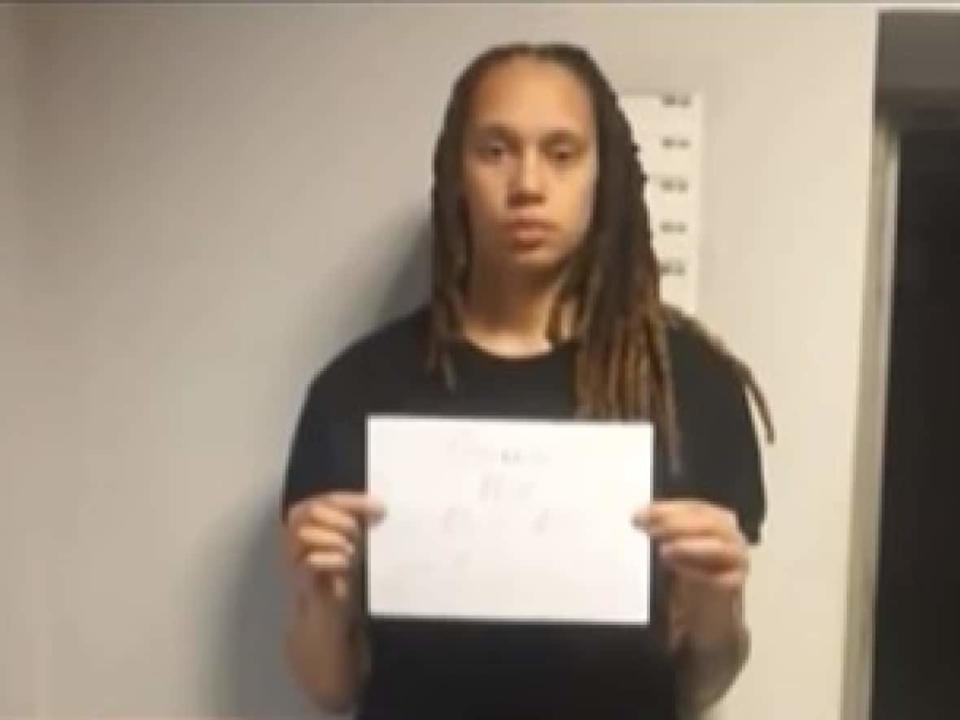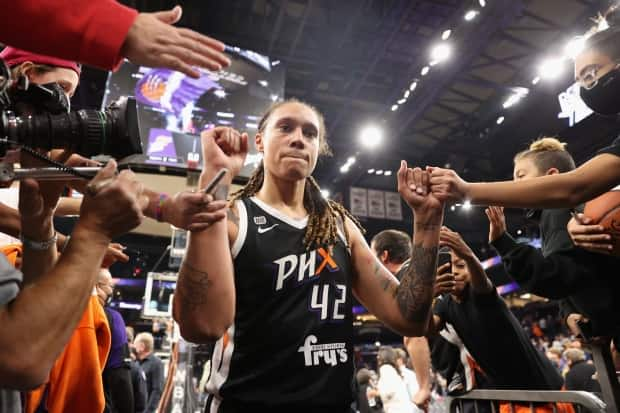WNBA star Brittney Griner, detained in Russia, is guilty only of pursuing a salary that matches her skill

This is a column by Morgan Campbell, who writes opinion for CBC Sports. For more information about CBC's Opinion section, please see the FAQ.
We've finally seen a post-arrest photo of WNBA star Brittney Griner — she stands in a drab room, wearing a black T-shirt and casts a blank stare into a camera while holding a sheet of paper bearing her name.
Russia's state-run news agency published the picture early Wednesday, so we know that Griner, at least in the moments after she was hauled into custody by Russian authorities for possessing cannabis oil and vape pens, was alive and relatively healthy. Beyond that, details about Griner's well-being and legal status are as sparse as the decor in the room where she was photographed. We don't know when the photo was snapped, or whether she has access to basics like nutrition, fresh air and a competent lawyer.
We just know, because Russian authorities have told us, that the seven-time WNBA all-star could face 10 years in prison if convicted of the offences they're alleging.
If cannabis oil and vape pens are still illegal in most places in North America, they're only barely so. Like driving with expired tags. It's a problem most jurisdictions over here solve with warnings and fines, and not life-changing stints in prison. That Griner faces a decade-long incarceration says more about Russia's outdated laws than it does about her.
It's also telling that Russian authorities waited some time — between a week and a month — before announcing the arrest, even though Griner is a two-time Olympic gold medallist, and one of the WNBA's biggest names. Imagine Canadian police arresting a Russian NHL star, detaining him without bail, and staying quiet about it for 20 days.
Wouldn't happen.
Ukraine invasion has strained relations
But Canada isn't Russia, and no North American athlete is as jammed up at the intersection of sports and geopolitics as Griner, who plays with UMMC Ekaterinburg between WNBA seasons.
In this situation, diplomatic tension between the U.S. and Russia is a constant. When Joe Biden defeated Donald Trump in the 2020 presidential election, Russian President Vladimir Putin lost a sympathetic head of state in the western hemisphere. And American assertions that Russian authorities arrest and imprison U.S. nationals on flimsy pretexts spans presidential administrations.
But Russia's invasion of Ukraine has turned strained relations volatile. The U.S. is among a long list of nations imposing sanctions that are hobbling Russia's economy. This week, the U.S. pledged to stop importing Russian oil. Russia, meanwhile, has the U.S. on a list of "unfriendly countries" it republished earlier this week.
How did Griner wind up in the middle of this Cold War reboot?
Money.
We could call UMMC Ekaterinburg her off-season job, except that team likely pays Griner several times what the Phoenix Mercury do. So if you want to call her a Russian league star who moonlights in the WNBA, you're not completely wrong.

Male athletes often have lucrative options
Roughly half of the WNBA's players toil overseas between seasons. Griner and WNBA legend Diana Tarausi play in Russia, where players can make life-changing money, but where the head of state is bent on annexing neighbouring countries by force.
That one of the top players on the planet is languishing in pretrial detention in Russia highlights the risks many WNBA players court when pursuing a salary that matches their skills. It's a frightening situation for Griner and her loved ones, and a high-stakes example of the costs that resource disparity imposes on female athletes.
When male superstars land in countries with dodgy human rights records or power-hungry dictators, it's often just one of a number of lucrative options. Anthony Joshua and Andy Ruiz were likely going to gross north of $20 million, no matter where they contested their heavyweight title rematch in late 2019. But Saudi organizers offered $40 million for the bout, so that's where they fought, 14 months after, according to Turkish officials, the Saudi government had Saudi-American journalist Jamal Khashoggi assassinated in Istanbul. Same with the NBA, which wouldn't fold if it refused to do business in China. We're not talking make-or-break dollar figures. Just the difference between obscene and merely gaudy money.
Contrast those choices with the ones facing players in the WNBA, where bonuses can push a top player's pay to $500,000 a year, but where base salaries range from $60,000 to $228,000 US per season. For players like Griner and Taurasi, a contract in Russia means a seven-figure salary and a chance at generational wealth. And for lower-paid players, that money can vault them from the paycheque-to-paycheque grind many regular people know, to the kind of financial security most of us crave.
It almost doesn't bear mentioning that male players of Griner's stature don't face the same dilemmas.
Yes, I know we can't superimpose an NBA pay scale on the WNBA. The NBA's median ($4 million) and maximum ($39.34 million) salaries rise and fall, but mostly rise, with the league's revenue — $10 billion this season. The WNBA, which grossed $60 million last year, and which just received $75 million in investor funding, isn't that big a business yet.
But there's more money available for talent.
How do we know?
Because the Las Vegas Aces are set to pay head coach Becky Hammon $1 million per season.
And because the New York Liberty chartered flights for its players — and was fined $500,000 by the league for violating the collective bargaining agreement, which considers private flights an unfair advantage.
That the WNBA expects first-class players to fly coach helps explain why players land in places like Russia, soaking up perks that are standard in top-flight men's leagues. And when the WNBA started fining players who arrived late to training camp from their overseas jobs, it sent the message that punishments trumped incentives, when players really just needed better options.
Russian authorities have said little
So every offseason, players weigh overseas employment, sometimes in countries hostile to the U.S. And this winter, circumstances aligned to put Griner in the most precarious position imaginable, facing jail time over a minor offence, caught between superpowers while Russia wages war in Ukraine.
Russian authorities have said little about Griner's current condition, but if they told us she's loving her all-expenses-paid stay in Moscow, why would we believe them?
This same government told us it invaded Ukraine to rid its neighbour of Nazis, except it wouldn't label the assault an invasion. It's a "special military operation," apparently. The story is as plausible as the one explaining 15-year-old figure skater Kamila Valieva's positive test for banned heart medication. If you thought her coaches doped her, that's just your Western bias. The real truth is that she drank water from the same glass as her grandfather, who somehow left heart medicine residue on the rim.
All those tales are taller than the six-foot-nine Brittney Griner, and we won't know the truth about her situation until she's back in the U.S. It will take brilliant people and delicate negotiations to make that happen. Few people can confidently forecast how this situation will resolve. But we know that as long as WNBA salaries lag, players will have incentive to test their luck in Russia.

 Yahoo Sports
Yahoo Sports 
